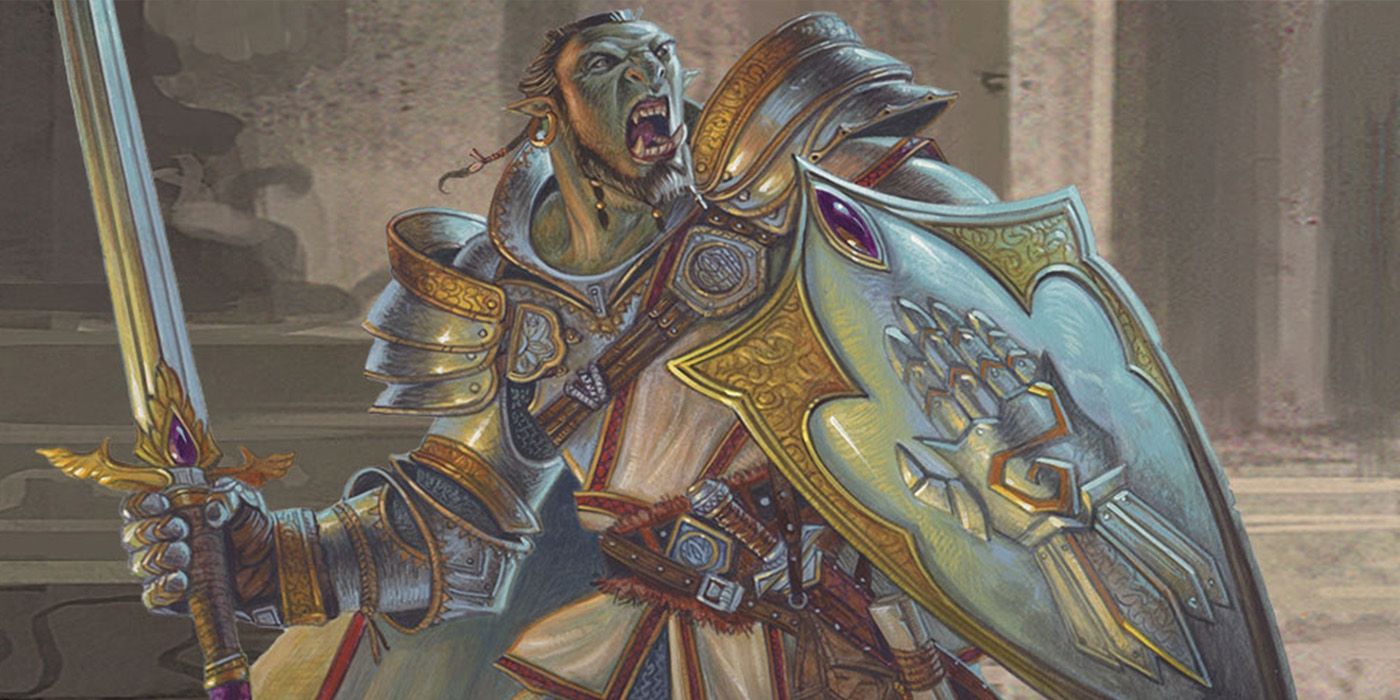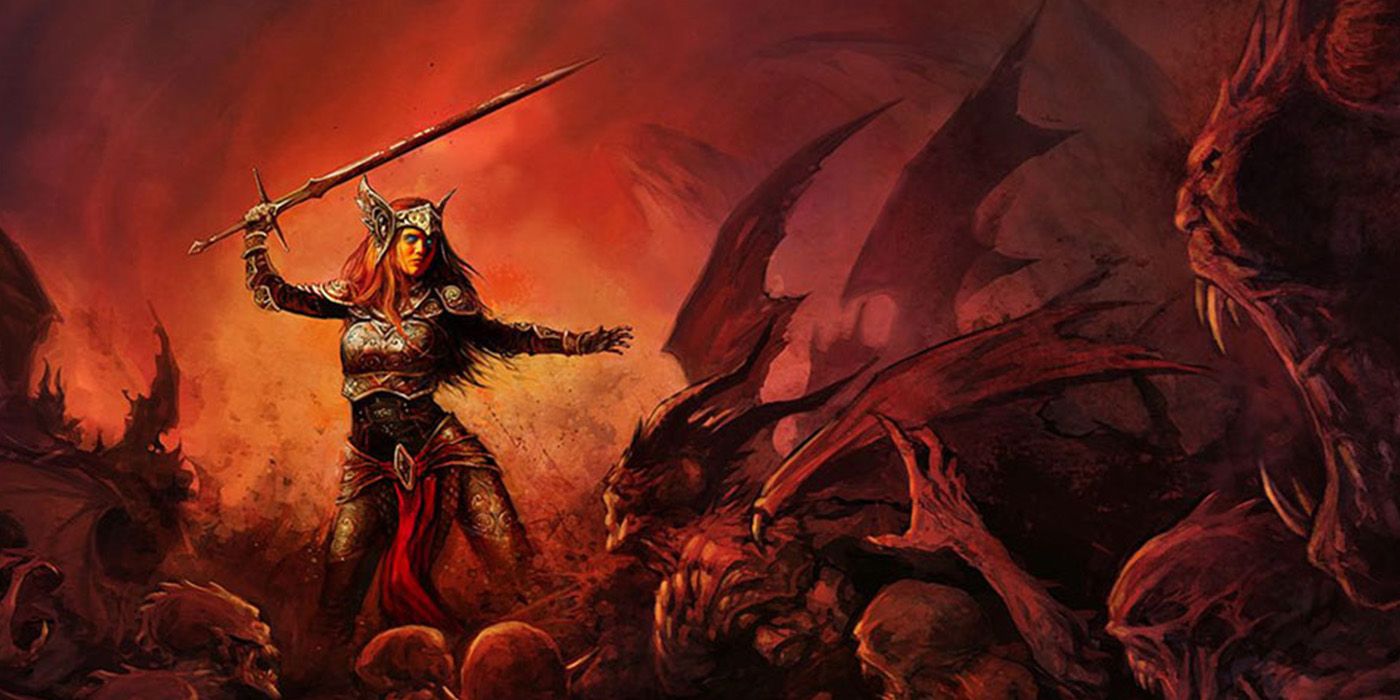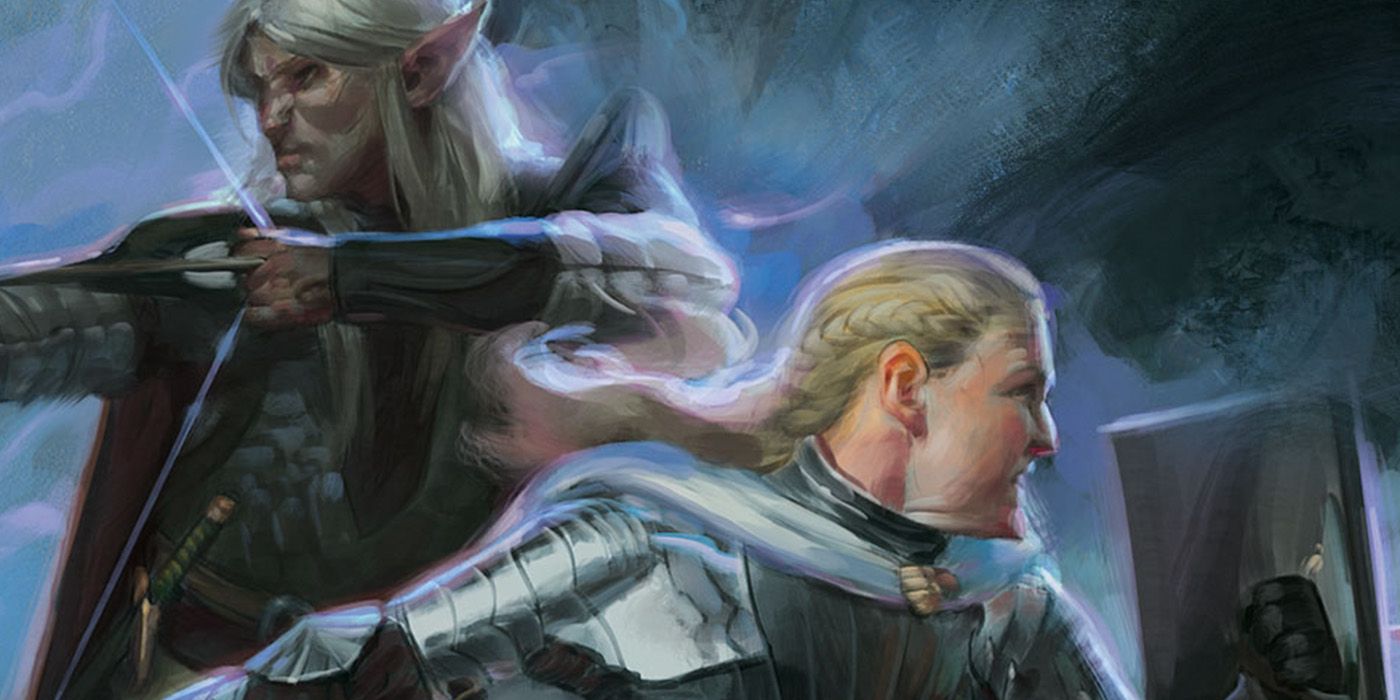Having come a long way since previous editions of Dungeons & Dragons, the paladin class is, in actuality, one of the best classes in the 5th edition. With both martial and spellcasting abilities, the paladin is a blend of fighter and cleric--this time without all the restrictions that forced paladins into a "lawful stupid" stereotype. Using the right build, they're the perfect blend of offense and defense, able to deal out damage while keeping themselves (and the rest of the party) standing.
In the past, D&D rules made it such that paladins were extremely restrictive with roleplaying options; they could only have the Lawful Good alignment or they'd lose their powers, which meant players didn't have many personality traits to choose from when crafting their characters. Overall, the restriction certainly hurt the paladin's reputation outside the game, with many players believing it just wasn't as "fun" a class to play. D&D 5th edition throws all of that out, removing restrictions and offering up different styles of gameplay for players to experiment with.
Paladin's Ability Scores
To start off character creation for a powerful paladin, let's set the record straight on a paladin's ideal ability scores--certain stats may have an effect on what race and feats are chosen further down the road.
First, the paladin's absolute highest stat is going to be either strength or dexterity, with no exceptions; paladins are a martial-based class first and foremost. The only question is which stat players want to rely on for their combat skills: players interested in finesse weapons should pick dexterity, while any others should select strength. Whichever stat becomes the primary should start around a 16+, and rise to 20 as soon as possible; then, whichever stat isn't being used can be dumped. While a dexterity build is totally doable, there's really no advantages over the classic (and much easier to manage) strength build, so the recommended choice here--especially for newer players--is strength.
The second-most important stat is going to be Charisma, as both a useful stat for skill checks and the paladin's spellcasting ability. Another fun thing about paladins is that they're the only primarily martial class that prizes charisma nearly as much as brute strength, which makes for some unique character roleplaying. While players can aim to have their starting charisma score a little lower than the 16+ of strength, this would be another stat to continue working towards a 20 over the course of the campaign.
Third-most important and the final stat that absolutely cannot be neglected in a strong build is constitution. Because it determines hit points and a character's hardiness, it'll never be a dump stat for any class--and paladins, as both melee combatants who need lots of hit points and spellcasters who may make frequent concentration checks, this will undoubtedly be a stat that the paladin will rely on all the time. Then, wisdom comes in fourth place for importance. Players can keep this stat between 10 and 12 comfortably, but don't let it get any lower: wisdom saving throws and perception checks are probably the most numerous in D&D 5th edition, so it's a stat the paladin should still have some skill in.
The bottom two stats are intelligence and whichever stat isn't the baseline for combat (which, in this case, is dexterity). With the opposite build of a dexterity-based combatant, strength would be in this position and could easily become the dump stat sitting around a score of 8; with dexterity, however, it's still more important to have more dexterity than intelligence. Get dexterity as close to the paladin's wisdom score as possible, and dump intelligence.
Best Races
Several races in D&D are practically built to support a paladin's skillset: variant humans, dragonborn, half-elves, aasimar, kalashtar, and tritons all make excellent paladins. Dragonborn are prime territory for a strength build, with bonuses to strength and charisma, resistance to one element of choice, and an innate breath weapon; the same goes for aasimar and tritons, which both get charisma bonuses and, in the triton's case, additional bonuses to strength and constitution.
Variant humans and half-elves are all-around golden choices: they can support both a strength or dexterity build, and they're both so customizable (in addition to the half-elf's natural charisma bonus) that it would be incredibly difficult to go wrong with either race. Kalashtar, a race straight from Eberron, may seem like a more unconventional choice--but they can thrive as any type of paladin too: with bonuses to wisdom, charisma, and a stat of choice, plus psychic resistance, telepathy, and advantage on wisdom saves, they're another great pick.
Paladin Oath Archetypes
To become paladin, that character must swear an oath, and this oath becomes the basis for all the paladin's specialized abilities--in other words, their subclass. The available paladin subclasses are currently the oath of devotion, the oath of the ancients, the oath of vengeance, the oath of the crown, the oath of conquest, the oath of redemption, and finally, the oathbreaker.
Out of the available archetypes, paladins who take oaths of vengeance or of the ancients are the best of the best. Vengeance paladins are perfect as strikers in the party; they shouldn't be relied on to hold off a horde, but by targeting a single enemy they'll shine. Vengeance paladins strike fast, hard, and deal high levels of damage to whichever enemy they're pitted against, and few others can match their skill at doing this. With some awesome utility spells that other subclasses won't get (including misty step, hunter's mark, and haste) and a Vow of Enmity ability that allows the paladin to shred through just about any defense, the oath of vengeance is always a strong choice--and nothing about this oath suggests that the paladin's alignment needs to be "lawful" anything.
Oath of the ancient paladins, meanwhile, are absolute juggernauts in a fight. They're especially skilled at fighting mages, outsiders, and basically anything with magical abilities--which often comes in handy during the hardest fights, as most players know. These paladins also get some cool spells, but their big draw is the fact that they'll eventually become resistant to all spell damage and will be able to choose once per day to just...not fall unconscious. That's huge for any character, making an oath of the ancient paladin an indomitable force on the battlefield.
Still, if neither of those subclasses appeals to some players then it shouldn't be a problem--all of these subclasses are pretty great save for two. Oath of the crown and oath of redemption don't quite measure up to the other subclasses in terms of the power in their abilities, but any other one will be a solid choice.
Skills and Feats
Finally, the paladin will need a certain set of skills to succeed. For a strength-based build, that means taking proficiency in athletics, intimidation, and persuasion--all skills the paladin will be naturally good at due to their ability scores. If there's room for a couple more, then grab perception and deception too; perception is good for everyone, and deception is another skill that would suit the paladin's charisma score. For a dexterity build, things would be different: intimidation and persuasion would still be the top choices from the paladin's skill list, but the rest of the skills would have to come from elsewhere. Dex-based paladins also need acrobatics, and they'd be smart to grab stealth or sleight of hand, too.
In terms of feats, a few exist that work well for any paladin: Inspiring Leader, Lucky (this one is just universal), Sentinel, War Caster, and Resilient (Con) will fit regardless of build and subclass. Then, paladins who use a shield will want Shield Master, while paladins using two-handed weapons should grab Great Weapons Master. Both oath of the ancients and oath of vengeance paladins can also make good use of Mage Slayer, and Magic Initiate is a feat that isn't mandatory, but at the same time would be a fun way to expand the paladin's spellcasting ability.
With a background like Soldier, Sailor, Folk Hero, or even Criminal, players should be able to round out their characters with confidence. Any paladin built according to these specifications will be totally ready for that brand new campaign.



